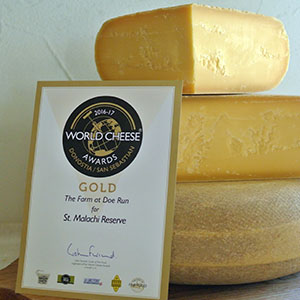Like its namesake, a centuries-old Catholic church nestled in a primarily Protestant section of Coatesville, PA, The Farm at Doe Run’s St. Malachi Reserve cheese stands apart in the cheese world.
“This cheese doesn’t fit into a category in terms of cheese type,” says Matthew Hettlinger, who serves as the farm’s co-cheesemaker with Samuel Kennedy.
When the two began working together at the end of 2013, St. Malachi was in the research and development phase. Unlike many award-winning cheeses, however, this one didn’t require much trial and error to perfect.
“We had an idea behind it, tried to implement it, then sampled the first batch a few months later and had really good results,” says Hettlinger. “We just tweaked it a little by changing the affinage and starting the washed rind early on, then progressing to more of a natural rind.”
It was the combination of both men’s backgrounds — Kennedy’s with Alpine cheeses and Hettlinger’s wash curd style — that led to what would ultimately become St. Malachi Reserve.
“We’ve had people tell us it resembles a combination of a Dutch washed curd and French Alpine cheese,” says Hettlinger.

The Farm at Doe Run is unique in that the operation is based around cow’s, sheep’s and goat’s milk. And its success with mixed milk cheeses is evident. Herds benefit from the 400 acres of lush and abundant pastures that have been farmed and preserved for hundreds of years.
St. Malachi Reserve is aged for about 16 months in natural quarry stone caves, which brings out the cheese’s unique flavor, yet presents challenges with natural molds that need to be kept in check. This is best accomplished by keeping an eye on the humidity and temperature, while increasing the oxygen flow. The salt rind levels also are quite varied, as are the levels of wet cloth techniques.
“The rind is almost like buttered toast, yet with an earthy note,” says Kennedy. “And across the paste are various sweet flavors like toffee, caramel, hazelnut and general nut flavors.”
St. Malachi is sold as young as eight months, but it’s the Reserve at 16 to 20 months that takes the flavor up a notch.
“What we found with the Reserve is the extra aging gets us to that aged Gouda texture, more firm and brittle,” says Kennedy. “This moves away from the sweet notes to more of a sweet/savory, bourbon flavor profile.”
It’s a cheese with a rising reputation. St. Malachi Reserve recently won top honors from the American Cheese Society in the Farmstead Below 39 percent Moisture category as well as tying for second as Best in Show out of 1,900 cheeses.
“That was big for us,” says Hettlinger. The cheese also won a gold medal in the 2016 World Cheese Awards, held in San Sebastian, Spain.

St. Malachi’s unique flavor profile warrants atypical pairings. Salted plums and black garlic have been successful, as has fresh thyme, with its woody notes that bring out the grassy aspects of the cheese.
“One of my favorite pairings is with locally-provided whiskey or something from Kentucky’s classic Bourbon County,” says Kennedy. “Nice aged whiskeys help to cut the richness of the cheese.”
As for appropriate beer accompaniments, Hettlinger suggests nothing too heavy to offset the cheese’s sweetness, such as brown ales or lighter porters.
Those seeking St. Malachi Reserve need to act quickly, as only about a dozen batches are released each quarter. The younger eight-month-old St. Malachi was sold out by early March due to high demand. The cheese is available at DiBruno Brothers’ locations in Philadelphia, in addition to other local specialty retailers and cheese-centric restaurants like Talula’s Garden in Philadelphia and 320 Market Café in Media, PA.
“After the ACS award, we did have a big release and cleaned out our caves,” says Hettlinger. “But Sam and I look at the cheese as we would our children, hanging on to it until we have to let it go.” CC



